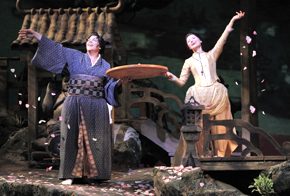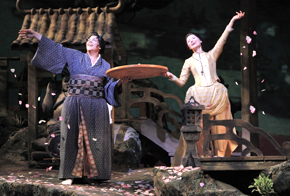
Photos by Cory Weaver
Can Madama Butterfly fail? “Impossible,” say some 195 performances by the San Francisco Opera alone. Only La bohème is more often performed, and that by a whisker. Both present us with a transient happiness whose precious fragility can never survive the pathos — the inescapable sadness — that is the destiny of human life.
San Francisco Opera’s newly staged production of Puccini's Butterfly , from a 1982 Lyric Opera of Chicago production by Harold Prince, certainly succeeded for the audience in the house on Tuesday. They stayed, and stood to applaud, despite several significant problems.
Thanks especially to Nicola Luisotti, who fused the orchestra and secondary singers into a brilliant ensemble, the emotional virtuosity of the Butterfly machine was on full display. The orchestra sang, sighed, soared, and sounded its recurring notes of doom with an urgency and transparency of tone that structured the whole show. We heard every nuance of this colorfully pictorial score.
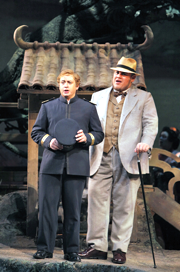
Unfortunately, Svetla Vassileva was fundamentally miscast as Madama Butterfly. Vassileva’s voice lacks the mid-range and lower richness required by this part, although she turned in some beautiful, delicate singing in softer passages. The duet in which Butterfly and her servant, Suzuki, fill the house with flowers anticipating her husband’s return was lovely. Still, this was a Butterfly with its heroine largely missing in action. On the whole, however, in forceful music lying in the higher range she regaled us with shrill tones and a wide vibrato. Her lack of tonal warmth and lush legato blocked her attempts to engage our sympathy with Butterfly’s heart-rending character. As if in compensation, either Vassileva or stage director Jose Maria Condemi afflicted her with constant busy, fluttering gestures out of harmony with Butterfly’s steadfast determination.
Nor did she gain real support from Stefano Secco, her Naval Lieutenant Pinkerton. His lustful fascination with Butterfly sets the tragedy in motion as Sharpless, the U.S. Consul in Nagasaki, watches, warns, and cajoles him to avoid a cynical marriage to the passionately devoted 15-year-old girl. Already at the start, Puccini’s doom machine is in operation.
Pinkerton must give voice to the casual pleasure-seeker who calls himself “the Yankee vagabond.” It’s not too much to say that Pinkerton must seduce us with the sheer splendor of his singing. This, Secco could not manage. His stiff, constantly loud tenor could not, in this relatively short part, move us to feel that Butterfly’s love is comprehensible.
Solid Performances From the Ensemble
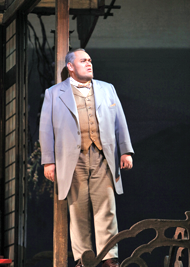
Luisotti built success, then, on the other singers. Daveda Karanas saturated the role of Suzuki with an intensity of feeling that left no doubt about her empathetic understanding of Butterfly’s emotion and of her impeding doom. Karanas’ rich mezzo — almost a contralto voice — worked magic in this crucial part.
Consul Sharpless, the other knowing witness to Butterfly’s tragedy, can seem no more than dutifully detached. But Quinn Kelsey shaped the role into a man of warmth and genuine concern for his fragile charge. His glowing baritone let us see more the caring sincerity of a friend than the routine motions of an official.
Thomas Glenn played the seemingly omnipresent marriage broker, Goro, with an officious precision and an attractive high, light tenor. Christian Van Horn’s Bonze thundered out in objecting to Butterfly’s conversion to Christianity. And current Adler Fellows Sara Gartland and Austin Kness nicely discharged the lesser roles of Kate Pinkerton and Prince Yamadori.
Condemi’s direction offered many moments in which characters interacted with telling detail. The Act 2 trio, centering on Sharpless’ many attempts to read out a letter from Pinkerton announcing his return to Japan, was especially vivid. This also was the moment when the production really took off musically.
But Condemi also loaded the action with fussy details and placed Butterfly’s usual discreet, behind the paper screen suicide (in the libretto) at center stage, where the girl let fly with a hearty dagger plunge to her belly.
Harold Prince, the Tony-award winning director and producer, was inspired to do this production by a trip to Japan. He included several importations from Japanese theater in his original staging. Among these were black costumed Koken — figures who move scenery and offer up props to singers. (I found them to be merely ornamental and distracting.
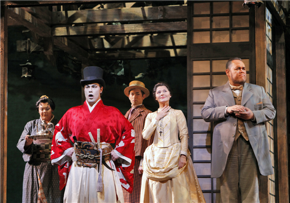
On Clarke Dunham's set a skeletal Japanese house of sliding screens occupies an enormous turntable that, as it rotates, displays an entry gate, an altar to the local god, a little garden with a cherry tree in bloom, a terrace leading into the house, and a deck from which Butterfly watches for Pinkerton’s ship, the U.S.S. Abraham Lincoln. An ominous, fleshy tree sprouts from its twisted trunk to engulf the delicate roof.
This scenery, designed for Chicago’s wide stage, lacked room to breathe here in the San Francisco War Memorial Opera House. It would be interesting to know what Harold Prince did with all of this, for he has long since abandoned restaging the action himself. From a vantage point nearly 30 years later, it all seems over-decorated and unnecessarily detailed.
Still, the care and intelligence that went into this production of Madama Butterfly created a species of success, and evinced much enjoyment by the opening-night audience. This production lets Puccini’s memorable music live on in our heads.

